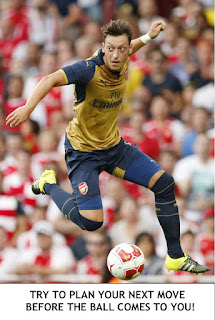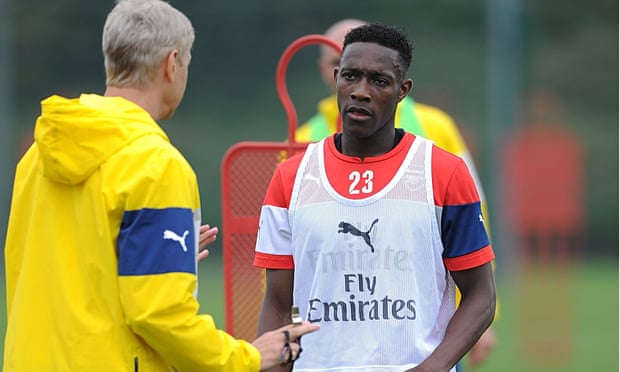Though we had a hiccup with the state of the pitches at the initial venue, it was great to be amongst other coaches and learning valuable information from the tutors and everyone in attendance.
There were some key messages that I took out of the first two days of the course. This was for me personally, as I am sure others took different aspects of the course out of it. Anyway, here are mine:
Setting the scene
Something that I really liked was the way tutors and coaches made the session relatable in a way that kids would really enjoy. We had 'match attax', naming players relevant to the topic, the qualities they have that make them good players, letting players offer their opinions. From that, I had the idea to create my own 'player challenge cards' (pictured right).
 |
| Mesut Ozil challenge card |
If you can set the scene well at the start of the session and quickly allow your players to grasp the concept of the session, they can gain a greater understanding of the topic and get them onside with what you want to achieve from the short time you have!
Incorporating the principles of play into your planning
This is moving slightly into UEFA B territory I suppose - but it has really helped me to consider the principles of play when planning my training sessions. I work with an u7s side at the moment, so I'm hardly going to go into phases of play but it does help me to keep my topics interesting and stops me rolling out generic topics that aren't tailored to the needs of the players. I was already aware of the principles of play but it was good to see them in action in coaching sessions and how I would add that to my own coaching. For my own development, as someone who would like to enrol on the UEFA B in the future, it was great to get a snapshot in how to consider these principles and include them in your coaching.
Challenges
When I think about this it is very obvious and I'm not sure why I don't consider these more often. Not that I do not do this at all, I do, but the course opened my eyes in to how best to give challenges and be able to review them too with players. I put on a session on day two and while I set challenges during this feedback I got was to set these at the beginning too. So now what I do is bring a whiteboard with me and set team, unit and individual challenges. This way everyone understands what the challenges are rather than just one or two players and I can get the messages behind the topic across to the group. In a recent session, I would constantly refer back to these challenges and by the end of the session the understanding within the group I was coaching and considerably improved!
Interventions strategies
 |
| How can you support the needs of your players? |
Plan. Do. Review!
At a first glance, the Module 3 logbook can look quite daunting. Five or six pages per session plan seems a lot, but it really helps for you to consider the needs of your players, how you are going to improve them and it gives you the opportunity to effectively review after. Being honest with myself, I don't always reflect as well as I should do but with these sessions I can't avoid it! The plan, do, review process is becoming a huge part of the Football Association's coach education. This could become influential in raising the standards of how coaches work. From personal experience of the Futsal Level 2 and Youth Module 3 in just the last few months - my own standards have certainly improved.
Overall - I throughly enjoyed the first part of the course and these were just some of the aspects that I took out of the course. I look forward to going back in April for the final two days and see where I can take it from there!
No comments:
Post a Comment